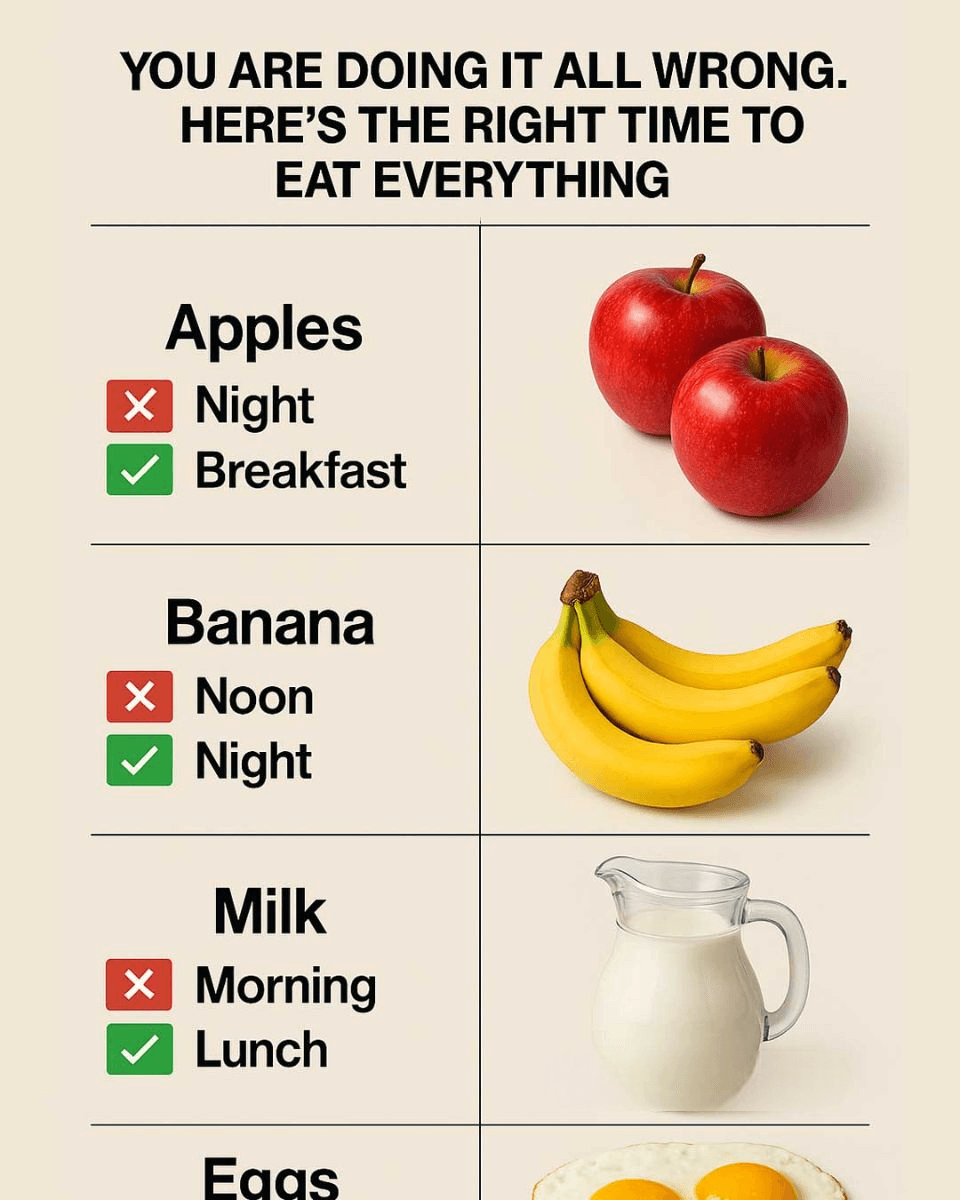Have you ever felt bloated, low on energy, or just off—even though you’re eating healthy? It might not be your food choices, but the timing of those meals. Our bodies run on a circadian rhythm that affects digestion, metabolism, and hormone function throughout the day. This means certain foods work better for you at specific times—boosting energy in the morning, supporting digestion mid-day, or helping you sleep at night.
This guide breaks down 20 common foods—from bananas to dark chocolate—and shows the best and worst times to eat them. A few simple timing tweaks can make a big difference in your digestion, energy, and overall health.
🥇 1. Banana
✅ Best: Night – High in magnesium and potassium, bananas help relax muscles and encourage better sleep.
❌ Avoid: Noon – May lead to sluggish digestion or a heavy feeling for some people.
🥛 2. Milk
✅ Best: Night – Contains tryptophan, which promotes sleep and soothes the stomach.
❌ Avoid: Morning – Can slow digestion and cause bloating, especially when combined with heavier foods.
🌾 3. Oatmeal
✅ Best: Morning – Provides long-lasting energy through complex carbs and fiber, which also stabilize blood sugar.
❌ Avoid: Night – May feel too heavy and hard to digest close to bedtime.
🍅 4. Tomatoes
✅ Best: Lunch – Loaded with vitamin C and lycopene, they’re great for daytime energy and immunity.
❌ Avoid: Night – Their acidity can trigger acid reflux or indigestion.
🍎 5. Apples
✅ Best: Morning – Packed with fiber to jumpstart digestion and help you feel full longer.
❌ Avoid: Night – Can ferment in your gut overnight, leading to gas or bloating.
🍚 6. Rice
✅ Best: Lunch – A good source of energy when your activity level is higher.
❌ Avoid: Night – High glycemic index may spike blood sugar and disrupt sleep.
🍗 7. Chicken
✅ Best: Lunch or early dinner – Lean protein helps with muscle repair and keeps you full.
❌ Avoid: Late night – Harder to digest, especially when fried or spicy.
🥑 8. Avocado
✅ Best: Morning or lunch – Healthy fats enhance nutrient absorption and brain function.
❌ Avoid: Night – Fat content can delay digestion and affect sleep quality.
🥚 9. Eggs
✅ Best: Morning – Rich in protein and healthy fats to keep you energized and satisfied.
❌ Avoid: Late night – May be tough on digestion and the liver just before bed.
🥕 10. Carrots
✅ Best: Lunch or snack time – Full of fiber and beta-carotene; great for a healthy crunch.
❌ Avoid: Not strictly off-limits, but excessive fiber late at night might be hard to digest.
🍞 11. Bread (Whole Grain)
✅ Best: Morning – Complex carbs provide energy when you need it most.
❌ Avoid: Night – Can lead to bloating or unnecessary calorie intake.
🍌 12. Citrus Fruits (Orange, Grapefruit)
✅ Best: Morning – Rich in vitamin C and great for kickstarting metabolism.
❌ Avoid: Night – The acidity can upset your stomach or disrupt sleep.
🍠 13. Sweet Potatoes
✅ Best: Evening – Packed with complex carbs and magnesium, they help promote calm and rest.
❌ Avoid: No major issue, but best to skip deep-fried versions.
🧀 14. Cheese
✅ Best: Midday – Provides a good dose of calcium and fat to keep energy up.
❌ Avoid: Night – Difficult to digest and can cause bloating or sleep problems.
🍫 15. Dark Chocolate
✅ Best: Afternoon – Contains antioxidants and a mild caffeine boost to lift your mood and focus.
❌ Avoid: Night – Caffeine and sugar content may keep you awake.
🐟 16. Fish (Salmon, Tuna)
✅ Best: Dinner – Omega-3s are anti-inflammatory and help your body relax.
❌ Avoid: Late night – Takes time to digest, which can interfere with sleep.
🌽 17. Corn
✅ Best: Afternoon – High in natural carbs and fiber, perfect for a daytime energy boost.
❌ Avoid: Night – May ferment in the gut and cause discomfort or gas.
🥒 18. Cucumber
✅ Best: Afternoon or early evening – Hydrating, light, and low in calories.
❌ Avoid: Night – Might cause bloating for those with sensitive stomachs.
🥜 19. Nuts (Almonds, Walnuts)
✅ Best: Evening – Contain healthy fats and magnesium that help your body rest and recover.
❌ Avoid: Morning (in excess) – Calorie-dense and may not offer enough satiety early in the day.
🍇 20. Grapes
✅ Best: Evening – Contain melatonin, which supports natural sleep rhythms.
❌ Avoid: Morning – High sugar content might cause a quick spike in blood glucose levels.
Final Note:
Eating well isn’t just about the what—the when matters just as much. By aligning your meals with your body’s natural rhythm, you’ll improve digestion, enhance energy, and get better sleep. Your plate should follow your internal clock just like your daily routine does.
